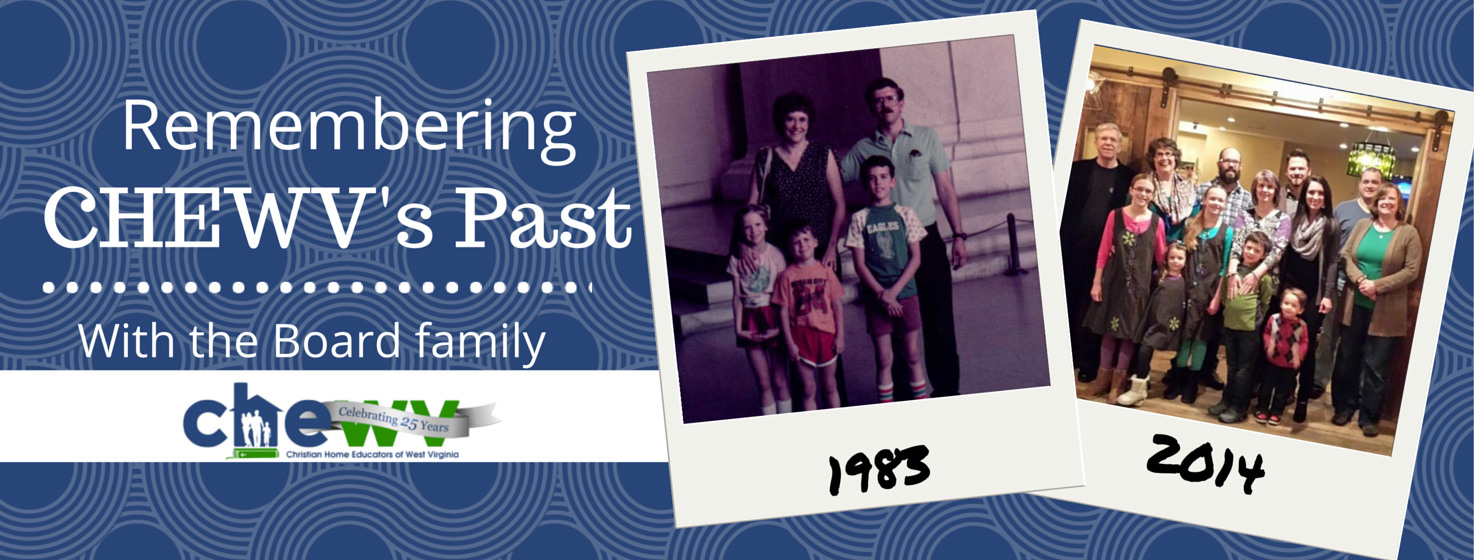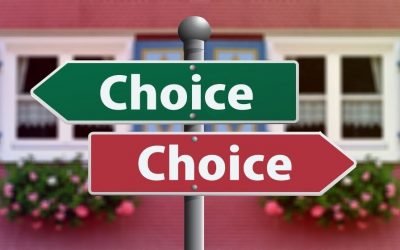The Birth of Legal Homeschooling: Not to be Taken Lightly
by Gene and Jan Board, one of CHEWV’s founding board couples.
It has been thirty years since we started homeschooling–a generation has passed and many things have changed.
When our family started homeschooling in the 1980’s, we used exemption K, the Parochial School exemption. In our zeal, we named our little school, had letterhead stationery, assigned a boys’ and girls’ bathroom, and even had a school newspaper (with a very plucky reporter). We already owned a yellow vehicle, so, as our children remarked, we even boasted a “yellow school bus.” It was novel and exciting.
Until it became evident that we could no longer use exemption K and things began to collapse. Should we move to another state that allowed homeschooling? Or should we band together with other families (if we could find them) who would start a Christian School? Doing so would require a huge expense for a building, staff, and materials. Plus, we felt compelled by God to teach our own children at home. Yet to continue homeschooling under the old exemption K would be breaking the law, and the consequences of that were frightening. We could go to jail and our children put into foster care. A lengthy and expensive litigation process would be required to get our lives back if we survived such an ordeal.
We spent much time in prayer and research and felt that our only logical choice was to seek a new law that would allow all families like us the freedom to homeschool their children. Less than a week later we received a call from a stranger, Don Fox, who asked us to meet with a small group concerning the possibility of creating a new homeschool law.
I was so naive about the entire process. I thought our little group would make a quick trip to Charleston, give an impassioned speech, shake some hands, and presto, a bill would become law. That was not what happened!
When we first met in Charleston as a group, the sponsoring delegates sent a legal clerk to write the bill that would be submitted. We knew what we wanted the bill to say and do, but the legal wording was a different matter. I called a homeschool mom in Virginia who read their state’s brand new homeschooling law to me as I copied it down. We made changes and were on our way.
This was before email, cell phones or social networking. We had home phones, fax machines, phone trees and letters (the kind that require stamps). When a hearing was scheduled, usually only hours in advance, it would take a while for us to get the message. These various committee meetings – Education, Finance, Judiciary, etc – were often bright and early, so by the time we got the message, packed, and drove down to a motel, it was the wee hours of the morning. It required planning to jump up, park and get into the Capital by 8am.
When we got to the meeting, we could only speak if called upon, and only for an allotted time. If someone from the other side of the issue reported something wrongly, we could not correct the information unless we were called upon. At the first Education Committee meeting of the House, the chief lobbyist of the teacher’s unions pointed out that homeschoolers had made recent news because they were in a show down with State and Federal Marshals in another state. Obviously, these were not the role models we were hoping for, and they were using a very broad brush to define homeschoolers. So we compiled reams of information and dutifully put it on the desk of the delegates and senators. We then watched from the gallery as many on the floor below looked briefly at our cover sheet only to immediately throw it in the waste basket by their desks.
We needed to make them aware of a constituency that they never knew existed. One way to do this was to take our children to Charleston as living examples of what we wanted to achieve. They went with us when we talked one on one with our representatives. They were grilled and observed and questioned. We would do “school” in the cafeteria and several legislators would stop by the table to see what the kids were doing. The kind ones would sit and talk with the children and even help them with math problems. Others used the opportunity to tell us why they didn’t think this was a good idea. Gene and I had to register as lobbyists because we were talking to more that just our own representatives. We were welcomed in some offices and told to leave in others.
We learned the importance of having homeschoolers from all districts talking with their own representatives. It makes a difference when we can directly affect their re-election! But at this time, there was only a handful of homeschoolers in the entire state…
These committee meetings were scattered throughout the 60 days the legislature was in session, and we never knew how long we would be needed in Charleston. Our senator, who was sponsoring the bill in the Senate, had been allotted two motel rooms. One was used by him to house constituents who were visiting him. If no one asked for the room by eight in the evening, he would allow us to stay there. We were not always able to stay free, but we were so thankful for those times when we could. At one point, I found myself doing laundry in a laundromat while the children sat in a warm car in their underwear and winter coats! Eating out all meals proved expensive, so when I could I would bring food from home. Gene ran his business long distance via the phone and his business partner. Those trips to Charleston became our “vacation” for the year, but what an educational trip it turned out to be!
Probably the most defeating moment came toward the end of the session. It was clear that the homeschool bill had enough backing in the House of Delegates to pass and then move on to the Senate. But in various meetings with the Speaker of the House, it became evident that he would not bring our bill up for a vote because the public school teachers had a real problem with children being taught by parents at home, and they had his ear. Without intervention the bill would die. A compromise was struck that would put qualifiers on both children and parents. As horribly restrictive as this was, it did allow the bill to become law and, for the first time since the nineteenth century, it was definitely legal to homeschool. While this WV law was the most restrictive of all the states’ homeschooling laws at the time, subsequent legislative action made it more lenient. An even better law is still needed today.
Our family did make large sacrifices for that first homeschool bill, but all praise belongs to God. We were just obeying what we felt God had called us to do. Had we chosen not to get involved, God would have used someone else to carry out His goals, but we would have missed so much! Through all the hassle and fear and discouragement, we learned that God is able to do abundantly more than we ever ask or dream! It was so encouraging to see what a few amazingly determined and persistent people could do when they felt led by God to do something bold for the benefit of others.
In the end, we spent 22 days of that session in Charleston and were asked to be present when the bill was signed into law. Finally the question of “Who owns the child? The state or the parents?” was answered as legal homeschooling in WV was birthed.




Recent Comments